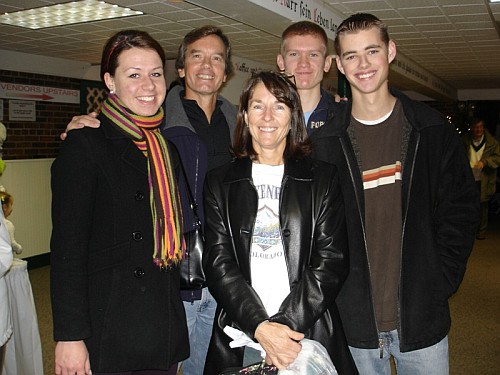By Frank Gray
The Journal Gazette

Jansen is to the far right with the two exchange students presently in FW – Andre Kern
and Denise Hänel
It’s the German equivalent of, “Don’t make me no never mind.” After a few months, though, Langle began to catch on to the language and understand the idioms and conversational German. Today, he says, he could easily sail through any course in German.
All that, in itself, isn’t too unusual. What is unusual is that Langle was an exchange student at all. Gera has an active exchange student program, and three or more students a year come to Fort Wayne from Gera, live with host families, improve their language skills and see America – or at least a little of it. For Fort Wayne students to go to Germany , though, is rare. A few years ago, a student from Northrop went to Gera . Langle went this year, and next year one student from Northrop is scheduled to go.
The city’s exchange rate, it would seem, is not in balance. That’s not important, really, but it is curious that at least 10 times as many Gera students come here as students from Fort Wayne go to Gera . Phil Suelzer, the coordinator for the exchange program run through Fort Wayne ’s German Heritage Society, sees the same imbalance.
Langle learned about the exchange program through the society when he started attending monthly meetings where he could sit down with native German speakers and practice his German. Suelzer told him about the program, and when Langle did go to Germany , he stayed with the families of exchange students who had come to Fort Wayne earlier.
Still, Langle is a rarity. How come? The whole idea of having a son or daughter go overseas for a year is foreign to American families, Suelzer said. “They don’t think about it, or they aren’t aware it’s a possibility. They’re not encouraged to do that. They don’t think it’s important,” he said. That’s surprising considering how much easier it is for Americans to go overseas than it is for foreign students to come here.
Students from Gera have to be members of one of several different exchange student organizations that have affiliations with American high schools. To become an exchange student, they have to pay a fee to the organization. That fee can be thousands of dollars, from as little as $3,000 to as much as $8,000 or $10,000.
American students going to Germany , though, don’t have to pay that fee. They do have to pay their airfare and supply their own spending money, but otherwise, they get to spend nearly a year in Germany for free. “The exchange student angle to me is a mystery,” Suelzer said. “There’s never been a push to have kids be interested in going over there, and none of the area high schools has encouraged kids to go as exchange students.”
There is one German teacher at Northrop who makes students aware of the program and encourages them to investigate it, Suelzer said, but otherwise, the opportunity never comes up. “We’ve done quite a bit in the German Heritage Society to generate interest, but we don’t work in the schools,” Suelzer said. Maybe the imbalance is the result of educational policies. In Germany , students begin studying English in elementary school. By the time they reach high school they are relatively fluent. Though students can start a foreign language in middle school here, many don’t take a foreign language until high school. In the future, things will only get tougher, Suelzer fears.
Many large schools used to give students a broad selection of foreign languages, from Latin and Spanish to French and German. Not any more. “The bigger thing is, as the German teachers retire, they’re not being replaced,” Suelzer said. “German is dying out. Spanish is a priority. The only thing left will be Spanish.”
It seems a contradiction. As the economy becomes global, we’re becoming less so.